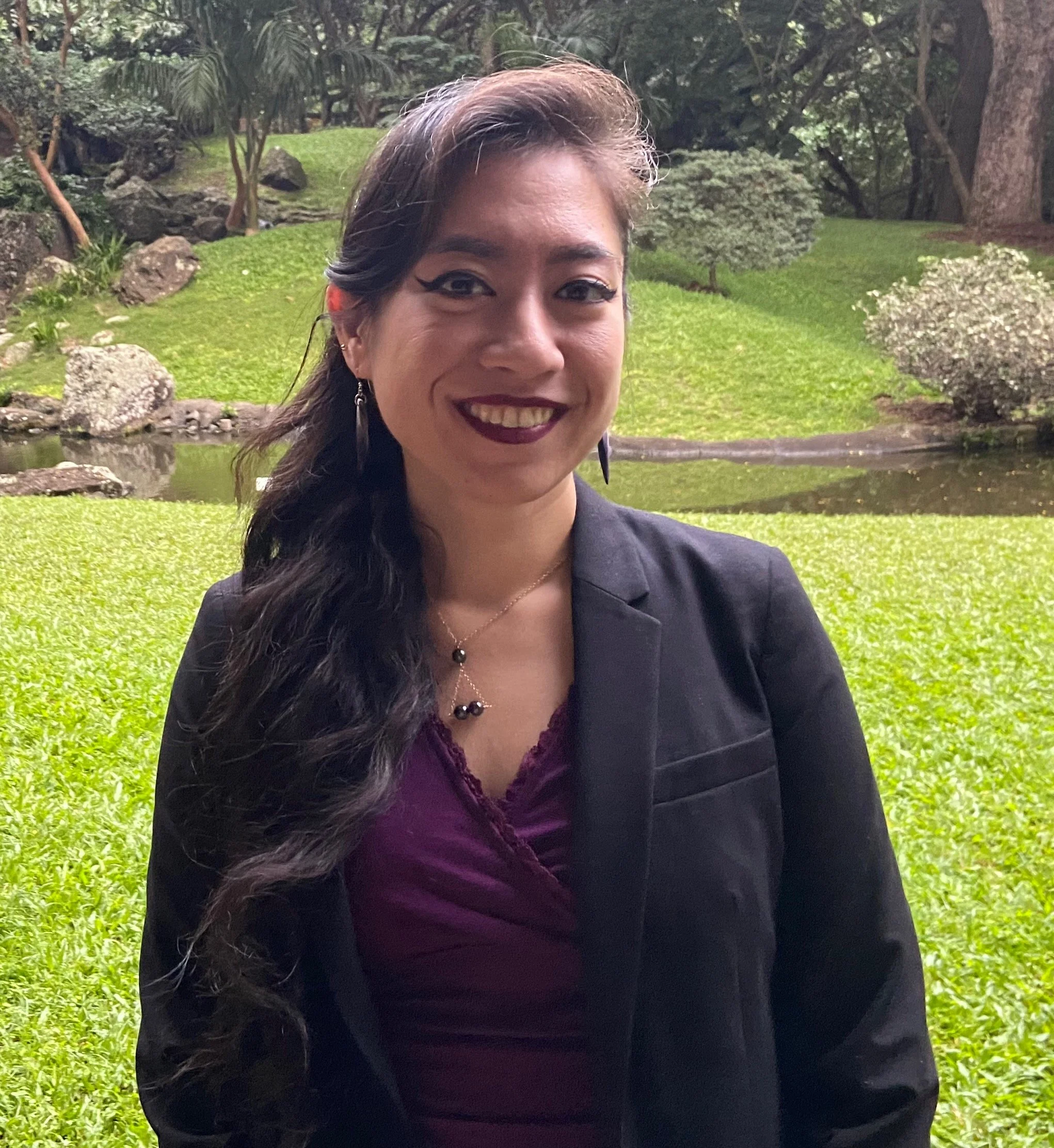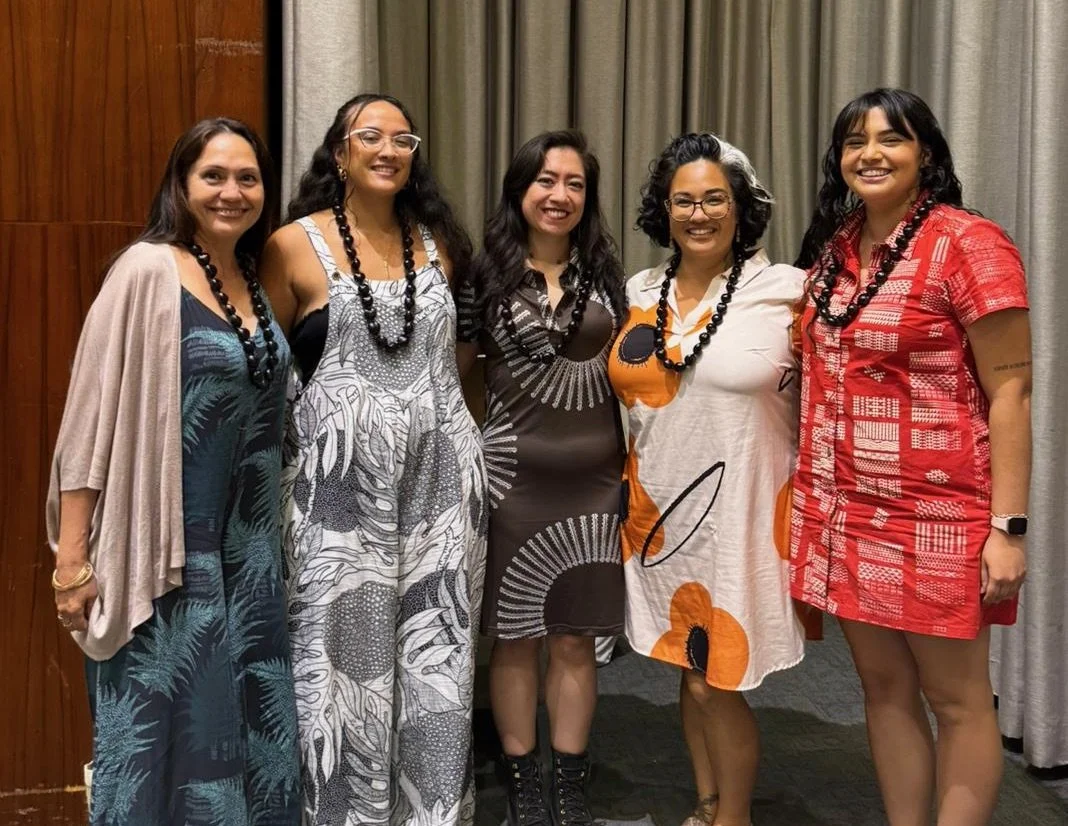Alyssa ʻĀnela Purcell
PhD Candidate in Political Science
Alaka‘ina Foundation EWC Graduate Degree Fellow (2026-2028)
ʻĀnela Purcell is an EWC Graduate Degree Fellow currently pursuing her doctorate in Political Science at UH Mānoa. She was born and raised in Pearl City and graduated from Kamehameha Schools in 2014. She earned her bachelor's degree in Hawaiian Studies from UH Mānoa’s Hawai'inuiākea School of Hawaiian Knowledge and a master’s degree in library science from UH Mānoa. She is also a recipient of the Hawaiʻi Pacific Foundation Doctoral Research Award.
Remarks by Alyssa ‘Ānela Purcell
Reception honoring Alaka‘ina Foundation
April 16, 2025
Aloha pumehana kākou,
My name is ʻĀnela Purcell, and I was raised by my grandma in the ahupuaʻa (land division) of Waiau, here on Oʻahu—where my ʻohana (family) has been rooted for generations. As a first-generation Kanaka ʻŌiwi (Native Hawaiian) graduate student, my journey through higher education has never been solely for myself. Like many others, I am here for my ʻohana, my community, and—of course as always—our lāhui (nation).
Earning my BA in Hawaiian Studies, a Master's in Library Information Science, and now pursuing my PhD in Indigenous Politics at UH Mānoa, I aspire to become an educator deeply rooted in Hawaiian knowledge, revitalizing and normalizing our ancestral knowledge systems within academic institutions like the University of Hawaiʻi.
Why? Well, in the wise words of King Kamehameha II, “Na wai hoʻi ka ʻole o ke akamai, he alahele i maʻa i ka hele ʻia e oʻu mau mākua?” or “Who would not be wise on a path walked upon by our ancestors?” This proverb speaks to the wisdom we gain by following the paths forged by our kūpuna (ancestors). It is their teachings and legacies that guide us toward meaningful action today.
Throughout my academic journey from Leeward Community College to UH Mānoa, pathways have been paved for me by various community scholarships, mentorships, and assistantships. For example, the Hawaiʻi Community and Pauahi Foundations supported my undergraduate studies. After that, Graduate Research Assistantships with the Hawaiʻi State Archives and the Hawaiʻinuiākea School of Hawaiian Knowledge sustained me through my graduate studies. And as a former Hawaiʻi Pacific Foundation Doctoral Research Award recipient and now the first Alakaʻina Foundation Graduate Degree Fellow, I can attest to the profound impact this support has had on my PhD journey.
During my first two years of my PhD, while much of the world was still working remotely due to the pandemic, I faced severe housing insecurity and was forced to move four times. That time in my life took a toll on my mental and physical health. It wasn’t until I secured housing through the East-West Center that I finally found the stability I needed to fully immerse myself in my research.
Beyond essential resources, these scholarships affirm that research grounded in ʻōlelo Hawaiʻi (Hawaiian language), moʻokūʻauhau (genealogy), and aloha ʻāina (love of land and nation) is not only rigorous but also deeply aligned with community needs. This support highlights how we as Kānaka ʻŌiwi are transforming the research landscape. We are not subjects or passive participants, but active leaders shaping scholarship amid a time of collective acceleration and resilience.
Living at the East-West Center for the past year and a half has strengthened my pilina (my connections) not only within our own community of Native Hawaiian scholars but across diverse networks from Asia, the Pacific, and beyond. Participating in programs like the Global Leadership Ambassadors, engaging in our Monday cross-cultural exchanges, and doing kava ceremonies with world leaders at Hale Halawai has demonstrated how interconnected our struggles and solutions truly are.
In these uncertain times, when so much around us feels fragile, it can be easy to slip into fear or disconnection. But our pilina—with each other, with our kūpuna, and with our collective purpose—offers a different path. At the East-West Center and across our Hawaiʻi communities, I’ve witnessed how leaning into relationships becomes a powerful act of resistance. By choosing empowerment over fear, and collectivity over isolation, we remind ourselves that we are not alone—and that real change is not only possible, but already in motion.
Our work continues because my story is not unique. Many Hawaiian students juggle multiple jobs, family responsibilities, and advocacy roles. We need sustained investment—culturally grounded mentorships, stable funding pipelines, and accessible housing—to ensure our lāhui no longer has to choose between our survival and our educational calling.
Mahalo nui to the Alakaʻina Foundation, Hawaiʻi Pacific Foundation, the East-West Center, and all of you in this room—for helping to pave this path. Together, we are reshaping higher education, uplifting ancestral knowledge, and empowering our communities. Because of you, we are becoming the ancestors we were meant to be—laying down pathways of wisdom, courage, and aloha for those to come. So again…Na wai hoʻi ka ʻole o ke akamai, he alahele i maʻa i ka hele ʻia e oʻu mau mākua? Who would not be wise on a path walked by our ancestors?
Mahalo.



